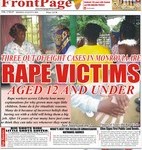Three-year-old Love walks uncomfortably into this clinic for victims of rape. A pretty little girl with braids, Love (not her real name) looks up nervously at her weeping mother. Love’s father is shaking with rage.
“I just heard last night that some teenage boys had been tampering with her,” the father says to the clinician here. “I could not sleep all night. I want to know if she is hurt or got some disease.”
The little girl is too young to tell anyone what happened. Staff here will examine her for injuries.
The father reported the case to the police but they had not yet arrested the boys accused of the attack. The mothers of the boys met the father at the station and tried to convince him not to seek charges.
Unfortunately Love’s case is not an isolated occurrence. Staff here at the Touching Humanity in Need of Kindness (THINK) Clinic on Du-port Road in Paynesville sees child rape on a daily basis. Of the 807 victims who came to this clinic and another run by Medecins San Frontiers in Duala in the first six months of last year 307 were children under 12 year of age. One in ten were under five.
Despite strong efforts by President Johnson Sirleaf to send signals that rape is intolerable the problem persists.
In children so young injuries can be great, according to Elizabeth Kekula, the supervisor of the clinic. “They can be bleeding and have deep cuts inside the uterus that need to be repaired with surgery,” Ms. Kekula says.
In one case the clinic helped a 10-year-old victim fight infections for three years before doctors at JFK Hospital finally had to remove her uterus, meaning she could no longer bear children. Life for a woman in Liberia who cannot have children can be particularly hard.
Two tested positive for HIV Aids
Some contract HIV/Aids. Ms. Kekula says two patients here tested positive last month. One was eleven, the other ten. Many do not come back for testing and so do not know they are positive.
Staff counselor here, Oretta Brooks Billy, says the mental impact on children can last a lifetime. “They feel guilty and ashamed. We have to try to convince them it was not their fault.” Ms. Kekula says that at first when these victims arrived at the clinic, the above problems play a lot on them but after going through the counseling six weeks and more, they tend to at least cope with the reality and try to move on but it is not easy. Parents also need to be counseled to keep the rape secret to protect the child from the stigma of the community. Many parents blame the child for the attack Ms. Kekula said.
Rape workers across Liberia hear many explanations for why grown men rape little children. Some do it for ritualistic reasons. Many do it because of incorrect beliefs that having sex with a child will bring them a big job. After 14 years of war many have just come to think they can take sex whenever they want it.
Love is lucky in one sense. Her parents brought her into the clinic within 72 hours of the attack. Coming in quickly is critical, say staff here. If victims are treated within 72 hours some sexually transmitted diseases including HIV/Aids can be prevented. In older girls pregnancy can also be prevented.
After examining Love, Ms Kekula says the little girl has small cuts that can be treated with antibiotics. Her father is clearly relieved. He vows to see the boys he believes responsible taken to court.
Cases will drop when perpetrators are jailed
But convictions of rapists are very rare. Of the 800 cases THINK saw here last year only four went to trial. Only one of the rapists was convicted. The Ministry of Justice, a body responsible for judging cases of rape and all related cases in the country, has come under criticism from Liberians and the international community for not prosecuting rape and other related cases. Last year a US State Department report said the Justice system in Liberia is corrupt and bribes are being received to undermine cases.
Ms Kekula says the high number of rapes will only drop when more perpetrators are jailed.

